“Prava Ludiny” (human rights) monthly bulletin, 2014, #10
A Lustration Law for the Record – and the Elections Provoking predictable UPA anniversary disturbances Russian "Right Sector War against Odesa Jews” Debunked The right to life
Missing Crimean Tatar Edem Asanov found dead The right to liberty and security
Two Crimean Tatar students disappear in the Crimea The right to a fair trial
Memorial recognizes Nadiya Savchenko as a political prisoner Law enabling Yanukovych’s trial in absentia passed Maidan killings suspect missing after being released from custody Social and economic rights
Positive anti-corruption laws passed with dubious amendments On refugees
Forced to flee then refused medical care Interethnic relations
Bogus claims of ’Muslim radicalism’ as weapon against the Crimean Tatars Victims of political repression
Returning - or Silencing - the Names of Stalin’s Victims Deported peoples
Crimean Tatar activists jailed: Closed court and bizarre charges Crimean Tatar Mejlis will not register as a ‘civic organization’ News from the CIS countries
Russian antagonism and suspicion of USA and EU at all time high Persecution of elderly activist exposing Russian soldiers’ deaths in Ukraine continues Kremlin plays ‘extremist’ card against ’Memorial’ rights organization Memorial: Russia pushed onto a customary and tragic path
Politics and human rights
A Lustration Law for the Record – and the Elections
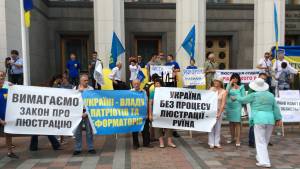
The farcical nature of Ukraine’s new Law on Cleaning up the Government [or lustration law] was demonstrated within hours of the law coming into force on Oct 16. A list of the first 36 heads to roll was made public with the full names and positions of each person given, including those who had already resigned because they didn’t want to fall under the law. It was all like a public executions – but of suspected witches rather than of known criminals. Each person on the list was deemed guilty by virtue of the post he or she had occupied.
The theory is that all those people, by holding their posts during the regime of former president Viktor Yanukovych are implicated in that administration’s undoubted corruption, plundering and repression. How true that is of, for example, the chief inspector of nuclear and radiation safety, can surely be disputed. The other problems are the number of people who have been conveniently left off the list, as well as those likely to be quietly ‘forgotten’ about and left untouched.
The draft law on lustration was adopted by parliament on Sept 16 without the text of the law having been made public. We can only hope that the MPs themselves knew what they were voting for and that it corresponded to the law finally revealed towards the end of September. The law has only now supposedly been sent for assessment to the Council of Europe’s Venice Commission. That body of legal experts is highly likely to slam the entire law, but after a large number of people have been named as falling under the law.
If it’s not quietly shelved after the elections
There can be no excuse for the demonstrations of mob rule in recent months where politicians have been thrown into rubbish containers. They do, however, indicate public frustration at the lack of progress in removing – or prosecuting – those seen as directly implicated in the crimes and corruption of the previous regime.
It is unfortunately likely that those now in power felt that they needed to come up with something, or risk the voters’ wrath at the elections in late October. It remains to be seen how the lustration process will continue once the elections are over.
Legal specialists and human rights organizations have long pointed out the major failings in the law. Yevhen Zakharov, head of the Kharkiv Human Rights Group, pointed to the quite excessive number of posts the law regards as subject to lustration. How can you possibly dismiss 95% of the managerial personnel of the law enforcement agencies? Who would you replace them with for a start?
Various high-ranking officials, including the Justice Minister Pavlo Petrenko, have suggested that relatively small numbers of officials will be dismissed. This may well be what ends up happening, yet if you read the law it covers a fairly large number of people, while leaving out all the MPs who, for example, voted for the anti-protest laws of Jan 16 2014. Nobody is suggesting that such MPs should bear anything other than moral liability for such actions. It is up to the voters to determine their future political career, however the fact that they would not be impeded from holding public office while the above-mentioned expert on nuclear safety is banned casts doubts about what this version of ’lustration’ will actually achieve.
The law as it stands covers only those in fairly senior positions under Yanukovych, or back in Soviet times. If they go for experience, therefore, in replacing staff dismissed, they will look to people who held similar positions under presidents Viktor Yushchenko or Leonid Kuchma. They do not fall under the law in question, but how ‘clean’ they are can probably be questioned. Or they will go for people with very little experience, probably also basing the choice on the candidates’ political opposition to the previous regime and / or communism.
The likeliest scenario is however highly selective lustration which, like selective justice, is a travesty of rule of law.
The law already makes some exceptions which can be questioned. It does not cover anybody elected to office. This may be justified with those elected by the public, via elections, but is not necessarily logical with respect to the Human Rights Ombudsperson who is elected by parliament. It also stipulates that a person must have held the position for at least one year during the relevant period. This does not necessarily make sense, but serves to remove any suggestion that the current President Petro Poroshenko would be subject to lustration given that he held a ministerial post under Yanukovych for nine months.
The next problem, of course, is that the law does not prevent people standing for election. The former head of the Security Service [SBU], Valery Khoroshkovsky is standing in a single mandate constituency. He can be elected, but would then be ineligible for ministerial posts, the top position in the SBU, etc. The current Ombudsperson Valeria Lutkovska was a deputy justice minister for the first two years of Yanukovych’s administration meaning that she does fall under the law, and yet her position now does not.
There are also people, such as the present head of the SBU Valentin Nalyvaichenko and current parliamentary speaker Oleksandr Turchynov who fall under the law as graduates of the KGB’s higher institute. There is widespread scepticism as to whether the letter of the law will be applied in their case.
There is no independent body overseeing the process. Instead decisions are taken by the Justice Ministry on the basis of checks carried out by the management of the government bodies where the specific person works. Zakharov suggests that this will be used as a method for getting rid of inconvenient employees.
At present, however, even the word ‘check’ is of extremely limited semantic value. Those dismissed thus far were chosen on the basis solely of the fact that their post is listed in the law. This is worlds apart from the lustration process that took place in other eastern European countries. In Poland, for example, people’s names were revealed only if they were found to have lied to the independent body about collaboration with the previous regime.
Under Ukraine’s law as it stands, certain people will be stripped of any right to privacy on the basis of the position they held, regardless of their own involvement. It will very likely soon become apparent that other people who should fall within the scope of the law are not touched.
In the meantime, a crucial law which should allow for a judicial overhaul is not being implemented in part because of artificial delays to forming the committee which is supposed to check whether judges have breached their oath.
One crucial task in cleaning up the judiciary which was especially compromised under Yanukovych’s regime was seen as being the replacement of court presidents, whose administrative posts had allowed them to wield enormous power over other judges and their cases. In a worryingly large percentage of cases, the court presidents previously appointed by the High Council of Justice retained their posts. According to Roman Kuybida from the Centre for Legal and Political Reform, dirty methods were often applied to ensure that court presidents kept their posts, however in some courts no alternative candidates were put forward with judges worried about negative consequences if they lost to the supposedly outgoing heads.
The majority of judges, prosecutors and others who played a direct role in repressive measures, corruption and so forth under Yanukovych’s administration remain in their posts. Ukrainians have the right to a judiciary and law enforcement system based on rule of law, and to a law on cleaning up the government that is not a populist method by politicians of getting people off their back and ensuring business as usual.
Provoking predictable UPA anniversary disturbances

Trouble on Oct 14, the anniversary of the founding of the Ukrainian Insurgent Army [UPA] was expected. There are always attempts to disrupt the traditional march held by UPA veterans, but this year was different for two key reasons. One was the fact that the march coincided with the last parliamentary session before the elections, and the rightwing VO Svoboda wanted to use the occasion to try to push through a bill recognizing UPA fighters as also being veterans of the Second World War. The second was the obvious benefit to Russia of any violent clashes on that day. The latter got what they wanted, although the provocation was too overt to go unnoticed.
The day looked set to be tumultuous for another reason. With 364 days to choose from, President Petro Poroshenko decided to select October 14 as Day of Defender of Ukraine. Feb 23, a day shared with Russia, undoubtedly needed to go, however the choice of a day closely associated with UPA makes confrontations even more inevitable. As if they weren’t predictable enough.
The draft bill, on the other hand, did not even get enough votes to be added to the agenda. Recognition of UPA fighters as equal combatants in World War II is a contentious issue in Ukraine, and one that would be better kept well out of the reach of politicians. The role of UPA during WWII, and especially its Volyn branch in the ethnic cleansing in Volyn, remains vehemently disputed. It is also fairly unrealistic to expect people whose fathers or grandfathers fought in the Soviet army against the Nazi aggressor (not for Stalin!) to understand how those who were waging war against Germany, the USSR and Poland, should be recognized as equally much veterans. The opposite is probably also true,
It was initially reported that VO Svoboda’s failure to get the votes needed for the bill to be considered, and demands that the communist party be fully banned led to the disturbances outside the Verkhovna Rada in which a number of riot police officers were injured when protesters hurled smoke canisters and stones and around 50 protesters were detained. In fact, though, it seems much more likely that the confrontation was planned in advance and not by those lobbying the bill.
There are various versions of what happened, with Anton Herashchenko, adviser to the interior minister, saying that he “could not exclude” Russian provocation, and both the VO Svoboda party and Right Sector denying any involvement.
The disturbances outside parliament were very similar to those on Dec 1, 2013 outside the president’s administration. There are extremely strong grounds for believing that the December disturbances were orchestrated, with notorious provocateur Dmytro Korchynsky and his Bratstvo party involved.
On Oct 14 a Bratstvo flag was seen, though Korchynsky denies involvement. It seems definite that another right-wing radical group calling themselves Revanche and announcing plans for the day’s events on their social network page played a very active role in the violence. Correspondents from the website INSIDER write that they observed how a planned peaceful march (which normally involves elderly UPA veterans) turned into a violent attempt to storm the Verkhovna Rada.
Around 3 thousand turned up for the march organized by VO Svoboda which arrived without any trouble at parliament and began loudly, but peacefully making their demands.
Another column of protesters appeared with young men in balaclavas with red and black flags, and banners showing a skull with a knife between its teeth. There were also people with Right Sector banners, though Right Sector later distanced themselves from the violence.
It seems that initially the first group were pleased at their arrival, but that changed swiftly as the young men marched up to the cordon of enforcement officers.
The square was soon full of smoke. The masked provocateurs, and INSIDER is surely correct in calling them such, tried to push their way into the Verkhovna Rada but were stopped by the riot police.
The radicals were attacking the police from behind the Svoboda activists, with the crowd mostly looking on unable to understand what was happening.
All of this is extremely reminiscent of the events on Dec 1. The group involved in the confrontation and carrying a black flag with a skull and knife are the Revanche group who on their VKontakte page are calling for a real military junta to take over and wage war with Russia.
Their aim on Tuesday was overtly different with Ukrainian enforcement officers the target of a determined attack.
At one point Tetyana Chornovol stood between the violent protesters and the National Guard and tried to stop the violence. The correspondents says that for a second it seemed as though the masked louts had backed off, but only in so much as they pushed those fighting with their fists ahead.
Video footage is likely to be scrutinized in the coming days by those determined to either spot the provocateur or spot the arch neo-Nazi. Both searches are depressingly likely to be successful.
Whether Revanche are provocateurs or far-right radicals with a dangerously destructive agenda is not quite clear. It is very apparent that there were people present whose aim was specifically to provoke trouble.
On Jan 1 this year, in the middle of EuroMaidan a fairly large number of people took part in marches to mark nationalist leader Stepan Bandera’s birthday. Interestingly, some known supporters of UPA, such as historian Volodymyr Vyatrovych, considered the planned march divisive and destructive, and called on people not to go on it. How many headed his call is not clear, nor whether he repeated it with regard to the Oct 14 anniversary. It is a call worth repeating.
October 14 is certainly a religious festival in the Orthodox tradition, and a day remembering the Ukrainian Cossack tradition. All true, however the reason the day provokes confrontation each year – and probably invites provocation – is the link with UPA.
Neither presidential decrees nor discussion of why this or that stereotype is wrong are likely to make the subject less contentious – and ripe for provocation.
Russian "Right Sector War against Odesa Jews” Debunked
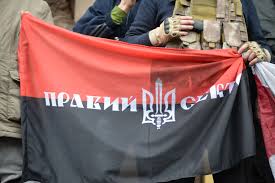
Russian attempts to fabricate anti-Semitic attack in Ukraine have yet again clashed head on with reality. This time the Odessa Jewish Community has been forced to issue a statement denying every part of the ‘story’ after being deluged with anxious calls from around the world.
The claims were indeed alarming. In an article entitled “Right Sector” has declared war on Jews in Odessa”, Izvestia asserted that “radicals” had desecrated graves and the monument to victims of the Holocaust with swastikas. 20 Jewish people had supposedly been savagely beaten up by ultra-nationalist Right Sector members and an anonymous police source was reported as claiming that another 36 robberies and attacks had been carried out by the Right Sector, all on members of the Jewish community. All of this was eagerly repeated by Russia’s LifeNews and other pro-Kremlin channels.
The official response from Berl Kapulkin, Press Secretary of the Odessa Jewish Community states that the phone calls to members of the community were prompted “by several statements made by a person calling himself the leader of the Jewish community of Odessa. A person with this name – Mikhail Maiman – is not only not the leader of the community, but is not even a member of it. Mikhail Maiman is not in any of the community’s databases and it seeks likely that he doesn’t exist.
None of the things claimed in these statements happened in the community – there were no meetings; no attacks; and we have not written any appeals or statements and do not intend to write them. Just the phrase alone that Odessa residents are planning to write to New York and ask the World Jewish Congress to ban a Ukrainian (!) political (!) organization should be enough to get a correct idea of these statements. “ The official statement notes that according to Jewish law the leader of the community is the rabbi, and that therefore any statements not from Abraam Volf, Chief Rabbi of Odessa and Southern Ukraine or the press service “are fakes (and sometimes provocation)”
It is not hard to understand why the Russian propaganda machine opted for a fictitious ‘leader of the Jewish community’. The real leaders and authoritative voices in Ukraine’s Jewish community have been nothing but trouble for the official Russian narrative since the beginning of EuroMaidan. Not only did they fail to provide graphic stories of anti-Semitic excesses and fears of pogroms under a ‘fascist junta’, but they publicly condemned such overt provocation and attempts to incite antiSemitism in Ukraine.
In late January 2014, Viacheslav Likhachev, the most authoritative researcher on anti-Semitism in Ukraine warned that attempts could be made by the Yanukovych regime to use supposed anti-Semitism as a way of silencing outrage if force were used against the EuroMaidan protests. There were public statements expressing similar concerns from the Association of Jewish Organizations and Communities of Ukraine [Vaad Ukraine] and human rights groups.
Russian President Vladimir Putin took up the baton after Yanukovych fled to Russia and claimed in February that Russia’s main concern was “the orgy of nationalists, extremists and anti-Semites on the streets of Kyiv”.
This prompted a statement by the Chief Rabbi of Ukraine, Yaacov Dov Bleich in which he said that despite the persistent claims in the Russian media, anti-Semitic incidents in Ukraine are extremely infrequent. He pointed out that the first act of anti-Semitic vandalism in the Crimea had taken place a couple of days after Russian troops were deployed on the peninsula.
The Russian media still tried to gain propaganda mileage out of that act of vandalism in Simferopol and again got caught out. The image was used in a falsified report claiming that Rabbi Misha Kapustin of the Progressive Judaism Communities of Simferopol and Ukraine had been forced to leave Ukraine because of the fascist hordes. The Rabbi had in fact told Juedische Allgemeine that he had been forced to leave Simferopol for Kyiv with his wife and family, fearing for their safety because of his active protest and the appeal he initiated against the Russian occupation.
These are just a few of the examples that on March 23 prompted far-right Russian nationalist writer Alexander Prokhanov to assert on nationwide television that some Ukrainian Jews were “bringing on a second Holocaust”. The Rossiya 24 presenter Evelina Zelenskaya got even more carried away and replied that Jews “brought on the first the same way”.
Since then Ukrainian Jewish leaders have continued to refute Kremlin lies and stereotypes. In the meantime both the Kremlin-backed militants in Donbas, as well as the ‘Ukrainian Choice’ party of Putin’s main spokesperson in Ukraine, Viktor Medvedchuk, have not concealed their anti-Semitic views.
Perhaps for those reasons Russia had for some time largely focused on ‘fascist junta’ rhetoric, and given anti-Semitism a wide berth. Wisely, as this fresh fiasco has shown.
The right to life
Missing Crimean Tatar Edem Asanov found dead
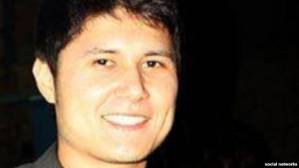
25-year-old Crimean Tatar, Edem Asanov, has been found dead in an abandoned sanatorium in Yevpatoria, a week after he disappeared on Sept 29. Edem Asanov was not politically active, and according to his sister was a peaceful person who was not inclined to conflict.
Refat Chubarov, head of the Mejlis or representative-executive body of the Crimean Tatar People says that Edem was hanged. He believes that the authorities are trying to establish a mood of terror and fear in Crimean society. Edem Asanov’s funeral will take place on Tuesday.
There have been four abductions or disappearances since Sept 27, and at least three other Crimean Tatar families will almost certainly be going through hell, together with the Asanov family.
In the early evening of Sept 27, two young Crimean Tatars were abducted from Sary-Su near Belogorsk in the Crimea. 19-year-old Islam Dzhepparov and his 23-year-old cousin Dzhevdet Islamov were forced into a dark blue Volkswagen Transporter and taken away in the direction of Feodosiya.
The claims from the police and FSB [Russian security service] that they know nothing about the abduction have been met with scepticism, which is exacerbated by their failure to find the young men despite having all details, including the minivan’s registration number.
Hundreds of Crimean Tatars gathered the next day outside Islam Dzhepparov’s home. Islam’s father had a meeting with the head of the occupation government Sergei Aksyonov on Oct. 1. Abdureshit Dzhepaparov says that everything was done to provoke Crimean Tatars to make measures in retaliations. “On the roofs around the building where the meeting took place there were a lot of snipers, people saw jeeps with men carrying machine guns, and around the city there were a lot of soldiers.”
Two days later, on Monday Sept 29, Edem Asanov set off for work at the Prymorye sanatorium in Yevpatoriya. We now know why he did not arrive.
23-year-old Crimean Tatar Apselymov Eskender has not been seen since Oct 3 when he left his flat in Simferopol and headed for work. He did not arrive, and there is no answer from his telephone. Shevket Namatullayev, a Crimean journalist, has passed on details about how the young man was dressed and a request from his parents to phone if people have any information
It is increasingly difficult to believe in any chance with these abductions or disappearances. They coincide with a major offensive against the Mejlis, or representative-executive body of the Crimean Tatar people and Muslims in the Crimea. Veteran Crimean Tatar leader Mustafa Dzhemiliev has spoken of 18 disappearances of Crimean Tatars since Russian invaded and annexed the Crimea in March this year.
Refat Chubarov recalls chillingly relevant words written by Memorial about the Northern Caucuses. “Abductions are carried out by staff both of the local, and the federal enforcement bodies. A number of the abductions take place according to the classic, “Chechen” scenario, when armed men in masks burst into a home and take the person they want away. However many abductions are carried out very ‘professionally’: a person leaves his home and doesn’t return, or later he’s found murdered.”
The almost certain murder of Edem Asanov, the abduction of two young Crimean Tatars and disappearance of a fourth young man of similar age, against the background of all other repressive measures, can only heighten the suspicion that the Crimean puppet regime and those pulling its strings in Moscow want to intimidate the Crimean Tatars and force them to leave their homeland.
The right to liberty and security
Two Crimean Tatar students disappear in the Crimea

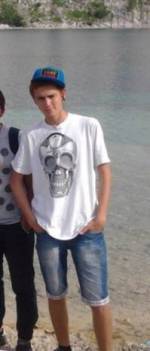
Artem Dairabekov Belyal Bilyalov
UPDATE: There are entirely divergent reports emerging in the media, all saying that one of the young men - Belyal Bilyavov - has been found dead, but varying radically as to the cause of death. A full update will be provided as soon as possible. Many hours later it remains difficult to give any definite information. According to one report, presumably based on information from the authorities, Belyal Bilyavov died from smoking spice [synthetic marijuana, though something more toxic must have been involved if this is true]. The doctors are reported to have "managed to save Artem Dairabekov. The other report (the first of the two) cites the head of the Krym NGO in Poland, Rusa Asaanov as saying that one young man was found dead, with signs of torture, while the other is alive, but injured.
Two students have been missing for around 24 hours and in the climate of fear after recent abductions and disappearances, concern is mounting. Artem Dairabekov, a first year student at the Tavrida National University set off for the university from his home in Simferopol on Monday at around noon. He dropped his little sister off at school and was supposed to pick her up at 6 p.m. He did not arrive and his telephone is switched off. His parents say that Artem is extremely responsible and would never have simply not turned up. They are understandably worried.
Artem’s aunt, Lilya Belyalova, has told Krym. Realii that his mother is beside herself with worry. The family has reported his disappearance to the police, and are ringing friends, hospitals etc.
According to Artem’s family, the other young student with whom all contact has been lost – Belyal Bilyalov is Artem’s friend.
Not counting these two young men, there have been four abductions or disappearances since Sept 27
25-year-old Crimean Tatar, Edem Asanov was found dead in an abandoned sanatorium in Yevpatoria, a week after his family reported that he had disappeared on Sept 29. The authorities are claiming that Edem killed himself.
In the early evening of Sept 27, two young Crimean Tatars were abducted from Sary-Su near Belogorsk in the Crimea. 19-year-old Islam Dzhepparov and his 23-year-old cousin Dzhevdet Islamov were forced into a dark blue Volkswagen Transporter and taken away in the direction of Feodosiya.
The police and FSB [Russian security service] have denied any part in the abduction. Scepticism about such denials was first expressed by Refat Chubarov, head of the Crimean Tatar Mejlis or representative body. It is further exacerbated by their supposed failure to find the young men despite having all details, including the number of the minivan in which they were taken away.
Hundreds of Crimean Tatars gathered the next day outside Islam Dzhepparov’s home. Islam’s father had a meeting with the head of the occupation government Sergei Aksyonov on Oct. 1. Abdureshit Dzhepaparov says that everything was done to provoke Crimean Tatars to make measures in retaliations. “On the roofs around the building where the meeting took place there were a lot of snipers, people saw jeeps with men carrying machine guns, and around the city there were a lot of soldiers.”
Edem Asanov disappeared two days later.
23-year-old Crimean Tatar Apselymov Eskender has not been seen since Oct 3 when he left his flat in Simferopol and headed for work. He did not arrive, and there is no answer from his telephone.
The abductions / disappearances have coincided with a sharp escalation in repressive measures against the Crimean Tatars and attempts, including through the Russian media, to claim that ‘radical Muslims’ are planning violent acts in the Crimea.
Both Chubarov and Ali Khamzin from the Mejlis have drawn chilling comparisons with the Russian authorities behaviour in Chechnya. Khamzin believes that the recent events in the Crimea are developing according to a ‘Chechen scenario’. He recalls that at the beginning of armed conflicts in Chechnya and other parts of the Caucuses there were abductions and disappearances, media claims of radicalization and of groups of fighters forming, and, as a result more active measures by the Russian enforcement bodies against particular groups (See: Bogus claims of ’Muslim radicalism’ as weapon against the Crimean Tatars)
Halya Coynash
The right to a fair trial
Memorial recognizes Nadiya Savchenko as a political prisoner
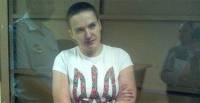
The Memorial Human Rights Centre which the Kremlin is trying to close has declared Ukrainian officer Nadiya Savchenko a political prisoner. This was reported by Mark Feygin, the lawyer representing Savchenko who has been held in detention in Russia since being captured by Kremlin-backed militants in Ukraine. Feygin even suggests that this could be not the least of the grounds for the current campaign against Memorial. A direct link with that one decision seems unlikely as the campaign against Memorial has clearly been prepared for some time as the defamatory programme on the pro-Kremlin NTV showed (more details here). On the other hand, Memorial’s clear position with respect to politically motivated criminal charges against Savchenko, Oleg Sentsov and the other Crimeans accused of ‘terrorism’, as well as its strong opposition to Russian aggression against Ukraine, may have been a factor in this latest serious offensive.
The USA has also demanded the release of Savchenko and Sentsov. During a visit to Ukraine last week, Victoria Nuland from the US State Department called the release of Nadiya Savchenko one of the conditions for the removal of economic sanctions against Russia.
Feygin also reports that the Russian Investigative Committee has refused to include evidence proving Savchenko’s innocence to the case. “The grounds are incredible and have no relation to the law”. The IC has claimed that the evidence does not have ‘legal force’.
It is possible, Feygin writes on Twitter, that the next court hearing on Oct 13 will be behind closed doors, with it unclear whether Savchenko will be brought to the court.
The hearing is over her appeal against forced psychiatric tests in the notorious Serbski Institute.
Please see: Russian investigators want Savchenko trial behind closed doors
Law enabling Yanukovych’s trial in absentia passed
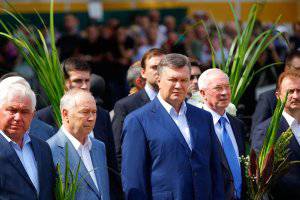
The law is one of the anti-corruption draft bills considered on Tuesday but warrants special attention given the major change it brings to Ukrainian legislation and the compelling grounds for taking the step. Law №4448а introduces amendments to the Criminal and Criminal Procedure Codes making trial of a person who is in hiding possible in cases where the alleged crimes involve threats to national security, public order, or corruption. Ex-President Viktor Yanukovych and his close associates, including the former prosecutor general Viktor Pshonka and interior minister Vitaly Zakharchenko are in hiding in Russia. There is no chance of any of them being extradited to Ukraine to face charges related to the gunning down of peaceful protesters on 18-20 February 2014 or major corruption. In fact, according to recent information both Yanukovych and his prime minister Mykola Azarov were recently granted Russian citizenship in a secret presidential decree.
This impasse was noted by Transparency International in its call on the Ukrainian government to support the anti-corruption legislation. Without the legislative innovation there was also no way of retrieving the vast wealth effectively stashed away abroad.
Dzerkalo Tyhznya reports that there were several unsuccessful votes, however the law finally gained 253 votes and was passed in its second reading and as a whole.
The law enables special criminal procedures to be applied if a person is in hiding and cannot be brought back to face charges, with these also enabling confiscation of property.
On Sept 25 President Petro Poroshenko stated that he had always been against trial in absentia, however the present situation where those believed to be behind the carnage in February are in hiding had prompted him to make an exception.
The situation is not entirely straightforward. The bill is currently intended to break an impasse in a situation where, outside the Kremlin, few would suggest that criminal proceedings are not warranted. Ukraine’s judicial system remains both corrupt and seriously influenced by politicians. Just a year ago, under Yanukovych, the suggestion that people could be tried and convicted in their absence would have been met with outrage, and with cause.
[Halya Coynash]
Maidan killings suspect missing after being released from custody
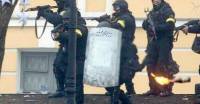
Some of the Berkut police snipers who gunned down peaceful protesters on 20 February 2014
Dmytro Sadovnyk, one of the men charged with involvement in the mass killing of peaceful protesters in February, has disappeared after his controversial release from custody on Sept 19. He had been due in court on Wednesday Oct 1 for an appeal hearing which could have reinstated his detention. He did not appear, with disturbing discrepancies as to why not. His lawyer is reported as claiming that Sadovnyk was seeing a neurosurgeon because his limbs had gone numb, and physically could not get to the court. The prosecutor, however, asserted that he was at the chief investigator on Wednesday, and asked for the hearing to be held without him.
The court refused and re-scheduled the hearing for Friday at noon but Sadovnyk did not appear. Journalists were removed from the courtroom, and a decision taken to set a new hearing for Monday, Oct 6. Late on Friday evening, Anton Herashchenko from the Interior Ministry announced that Sadovnik had not returned home and was now a wanted man. The Pechersky District Court on Oct 4 issued a warrant for his arrest.
It was a judge of that same court who ordered his release from custody on Sept 19. Sadovnik was in change of the Berkut special force unit suspected of the sniper shooting in cold blood of 39 EuroMaidan protesters. Given that the charges against him are so serious, the court had to provide grounds for changing the restraint measure to house arrest. Those given were that he has a wife, three children and a flat in Kyiv, and a good character reference. The application from the prosecutor for Sadovnik and two subordinates to be kept in custody was thus accepted only with respect to the latter two.
The news of his release caused public anger and was also strongly criticized by the Prosecutor General’s Office which appealed against the decision. It was that appeal hearing which Sadovnik chose not to attend.
With Sadovnik now on the run, there are a large number of questions that need answering, and not only why the judge released only one of three men charged with such serious crime. Sadovnik was supposed to have an electronic bracelet on him all the time. This, it appears, had been left in his house. It seems likely that, at very least, the police and prosecutor’s office were aware of Sadovnik’s disappearance long before this was publicly announced. Journalist Serhiy Vysotsky, for example, wrote on his facebook page hours before Herashchenko’s announcement that Sadovnik had fled.
There were clashes in court on Oct 1 between former Berkut officers who had come to support Sadovnik and EuroMaidan activists. The presumption of innocence must apply in all cases, and Sadovnik has not been found guilty by a court. He has, however, absconded under circumstances which arouse deep concern, especially since his is one of the few prosecutions even initiated over numerous crimes during the EuroMaidan protests.
Halya Coynash
Social and economic rights
Positive anti-corruption laws passed with dubious amendments

On Tuesday parliament adopted vital anti-corruption laws envisaging the creation of an independent anti-corruption bureau, mandatory disclosure of the real owners of companies; transparent funding of election campaigns and others. This is a major step forward, however there have been some voices of criticism.
The Centre for Countering Corruption issued a statement on Tuesday accusing the parliamentary profile committee of having introduced amendments which will strip the Anti-Corruption Bureau of political independence.
The Centre says that the amendments have destroyed the provisions preventing people who worked in law enforcement bodies involved in (nominally) fighting corruption from working in the Bureau. The Centre fears that this will mean that new people will not be taken on, and the same people supporting the corrupt system at present will remain. They are also concerned that the amendments have made it easier to remove the head of the Bureau for political motives. If this was impossible before, now only 150 MPs – one or maximum two factions in parliament need to propose a vote of no confidence with a simple, not a constitutional majority required for it to succeed.
The draft laws passed were drawn up with the cooperation of Transparency International in Ukraine and other civic organizations.
There were five bills in total.
On the basic principles of state anti-corruption policy in Ukraine for 2014-2017 (№5085);
On creating an independent anti-corruption bureau
On fighting corruption;
On amendments to some legislative acts identifying the real owner of a company
On amendments to the Criminal and Criminal-Procedure Codes on inevitability of punishment for crimes endangering national security, public safety and corruption.
On refugees
Forced to flee then refused medical care

Civic organizations have sounded the alarm after receiving numerous complaints from people forced from their homes that they are not able to get healthcare. The UNHCR believes that as many as 300 thousand Ukrainians have been forced to flee since Russia’s invasion of the Crimea and the conflict in Donbas, a large percentage of whom are ‘internally displaced persons’ [IDP].
The government is continuing to delay adoption of vital legislation regulating IDP rights, procedure for obtaining assistance, etc.
In the meantime, individual medical establishments are imposing their own unreasonable demands. In an open letter to the Health Ministry, Vostok SOS which works with IDP say that they have received a number of reports that clinics, etc. are demanding that people either pay for medical services or provide proof of registration in the area the medical establishment is located in.
Medical services may well be stretched, but they are dealing with people forced to leave their homes where they are doubtless registered. Most have been placed in temporary accommodation, often places fitted only for the summer.
Winter is coming, and in present conditions IDP are likely to be especially affected by the usual increase in winter illnesses. Most are not able to work and earn a living, many are unable to receive social benefits. The demand that they pay for services is in most cases totally unrealistic.
Vostok SOS is calling on the country’s leaders to provide an official position on the provision of healthcare to IDP and for the Health Ministry to explain this position to local branches of the department.
Interethnic relations
Bogus claims of ’Muslim radicalism’ as weapon against the Crimean Tatars
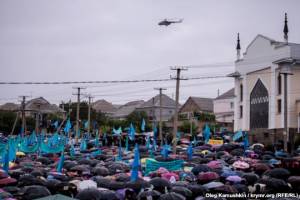 Military helicopter flies over one of the remembrance gatherings marking the seventieth anniversary of the Deportation of the Crimean Tatar. Two days before the anniversary, the occupation government banned all events, and soldiers and riot police were used to stop people gathering in the centre of Simferopol
Military helicopter flies over one of the remembrance gatherings marking the seventieth anniversary of the Deportation of the Crimean Tatar. Two days before the anniversary, the occupation government banned all events, and soldiers and riot police were used to stop people gathering in the centre of Simferopol
Recent developments in Russia and the Crimea suggest that Kremlin strategists are hoping to gain dividends out of mounting fears in the West of the hard-line Islamic State and ‘Muslim radicals’. The ploy has worked in the past with western leaders willing to turn a blind eye to the methods used, for example, against rebels in Chechnya in the name of a purportedly shared fight against terrorism. The manipulation as regards the Crimean Tatars, however, is overt, the ‘extremism’ invented as a weapon of repression and the dangers immense.
It is no accident that the announced application by the Russian Justice Ministry to close the renowned human rights organization Memorial coincided with a defamatory TV programme alleging that the organization is hand in glove with terrorists and radicals now fighting for the Islamic State.
Equally scurrilous reports in the Russian media have now given voice, if no backing in hard facts, to recent attempts to present Crimean Tatars as ‘radical Muslims’ who could unleash a wave of violence in the Crimea.
Russia and its puppet government in the Crimea wasted no time in unleashing repressive measures against the Crimean Tatars, ethnic Ukrainians and all opponents of Russian occupation. There have been armed searches of Crimean Tatar homes, mosques and religious schools; warnings issued over supposed ‘extremism’ to the Crimean Tatar newspaper Avdet, the only Crimean Tatar TV channel ATR, as well as to the Mejlis, or representative-executive body of the Crimean Tatars and its head, Refat Chubarov. Together with veteran Crimean Tatar leader Mustafa Dzhemiliev, Chubarov is now banned from his homeland.
From exile they have watched the latest wave of terror in which four young Crimean Tatar men have been abducted or disappeared. One – Edem Asanov – was found dead last Monday in circumstances which only the authorities assert are unsuspicious.
According to Ali Khamzin from the Mejlis, the events in the Crimea are developing according to a ‘Chechen scenario’. He recalls that at the beginning of armed conflicts in Chechnya and other parts of the Caucuses there were abductions and disappearances, media claims of radicalization and of groups of fighters forming, and, as a result more active measures by the Russian enforcement bodies against particular groups.
On Oct 8 a particularly sinister article entitled “Islamists in the Crimea are getting up to something” appeared in the Russian newspaper Nezavisimaya. It begins with the words: “Fighters schooled by war in Syria and Novorossiya are amassing on the borders of the peninsula”.
The author, Vladimir Mukhin then claims that the Ukrainian authorities have decided “to make use of the fragile ceasefire in the South-East of the country so as to organize, together with Islamic radicals, disturbances in the Crimea”. The author supposedly bases this assertion on reports from “several independent sources”.
“The Russian authorities, judging by everything, are taking such reports seriously. The media speak of a recent increase in searches and arrests of members of radical Islamic organizations which are continuing illicit activities in the Crimea. However Moscow is for the moment unable to influence the main threat - Crimean Tatar fighters in Ukraine”.
Not one such arrest has been reported,
The nature of the author’s ‘sources’ soon becomes clear. One is Ruslan Saitvaliev, head of the recently created and highly contentious Tavrida Muftiat. Within days of its creation, Saitvaliev gave an interview to a Russian newspaper in which he claimed that most Crimean mosques are led by supporters of ‘non-traditional Islam’, specifically ‘vakkhabites’ or members of Hizb ul-Takhrir, which is banned in Russia.
The Spiritual Directorate of Muslims of the Crimea was outraged by such provocative nonsense and demanded an explanation from the High Mufti of Russia who had played a role in the muftiat’s formation.
Whether an answer was received is not known, but the explanation for such wildly wrong assertions is becoming increasingly clear. According to the author, Saitvaliev has once again obliged by claiming that on social networks these ‘vakkhabites’ and members of Hizb ul-Takhrir are calling on people to begin a war in the Crimea.
The author cites Igor Druz from the Kremlin-backed militants of the self-proclaimed Donetsk people’s republic as claiming that groups of fighters for action on the peninsula have been formed from Crimea Tatars previously fighting in Syria. The latter are supposedly undergoing training at an SBU [Ukrainian Security Service] base.
“He believes that in the course of subversive actions important parts of infrastructure, including railway junctions and stations, could be destroyed. However the main goal of the fighters, Igor Druz says, is to ‘raise a revolt’. The secretary of Russia’s Security Council Nikolai Patrushev can also not exclude such a scenario as he told colleagues from the CIS at the end of September.”
According to other unnamed sources, there are two recruitment points for Muslims in the south of Ukraine, while equally unnamed specialists say that the “greatest danger for Russia is concentrated in Dnipropetrovsk”. This, it is asserted, will come from a regrouping of the Krym Crimean Tatar volunteer battalion which the author calls a “special battalion which included Islamic fighters”. Not surprisingly, given the Russian media’s chief bogeymen, governor of Dnipropetrovsk Ihor Kolomoisky is mentioned as not just funding the battalion, but now supplementing its numbers with the constantly vilified nationalist Right Sector. The battalion’s new task, the author claims, is to carry out subversive actions in the Crimea.
Lest the reader be left sleepless with anxiety, the author has words of reassurance. Russia’s Security Service and military are onto this and will be ready, together with what were the internal forces in Ukraine and have now been regrouped and supplemented with local residents. These “have a good command of the situation and skills at fighting insurrectionists from the time of the Kyiv Maidan”. The so-called ‘self-defence’ paramilitary units who are clearly referred to have been responsible for numerous violent attacks and abductions over the last 8 months. There is video footage showing that they were behind the abduction of Crimean Tatar Reshat Ametov whose mutilated body was found on March 16.
In September Sergei Aksyonov, the ‘prime minister’ installed at gunpoint after Russian soldiers seized government buildings on Feb 27 effectively threatened to deport or prosecute those guilty of what he called causing inter-ethnic conflict, this including refusal to recognize Russian occupation. That message has been reiterated in more sinister mode by the abduction and disappearance of four young men in the space of just over a week and by such articles.
The aim is also clear: intimidate as many Crimean Tatars as you can into submission, and force the others to flee to mainland Ukraine. Both Mustafa Dzhemiliev and the Mejlis have called on Crimean Tatars to remain in their homeland. They have also called repeatedly for western countries to take heed of the situation the Crimean Tatars are in. Those same countries were slow to take any serious measures against Russia and are now increasingly making an easing of sanction contingent only on Russia’s backing off from eastern Ukraine. In light of the treatment which the Crimean Tatars – and others in the Crimea who open oppose Russian occupation – are facing, any such willingness to effectively accept Russia’s annexation of the Crimea would reveal not only geopolitical weakness, but moral bankruptcy.
Victims of political repression
Returning - or Silencing - the Names of Stalin’s Victims

In her Requiem, the poet Anna Akhmatova wrote: “I would like to call you all by name, but they took away the list. It was Memorial, the organization which the Russian authorities are now trying to shut down, that enabled many of us to learn where parents, grandparents or others had been executed in the worst years of Stalin’s Terror. For the last 8 years Memorial has organized a ‘Returning of the Names’ on the eve of October 30 – Day in Remembrance of the Victims of Political Repression. On Lubyanka Square near the Solovki Stone brought to Moscow in the late 1980s from the first labour camp at Solovki, people take turns to read out the names of those executed in Moscow during the Terror.
“We read the names of those who were executed during Stalin’s Terror. In Moscow alone over 40 thousand people were killed. We have been reading the names for many years and have not read out even half of that list. We know contemporary political prisoners as well. Thank God, the death penalty is not applied these days, and the list which needs to be read out on Lubyanka Square is not being added to”
- Alexander Cherkasov, member of the board of the Memorial Human Rights Society.
There were victims in all Soviet republics, including, of course, Ukraine. For many, the only records are the ‘files’ kept of each of the victims, sometimes with the dates when they were ‘rehabilitated’.
No graves, usually no indication at all where they might have been buried.
Under Vladimir Putin, access to the archives has become more difficult, and now Memorial itlself could be faced with closure.
Since 2007 there have been steady moves away from recognition of the crimes committed during the communist period, and especially under Stalin. Talking to teachers in June 2007, Putin gave his stamp of approval to ‘positive moves’ in the presentation of the country’s history. Up till recently, he said, you could read things in history books which made your hair stand on end. The new history textbooks by Alexander Fillipov promoted for schools presented Stalin as “one of the most successful leaders of the USSR”. “The outcome of Stalin’s purges was the formation of a new governing class, able to cope with the task of modernization given the shortage of resources – unwaveringly loyal to the upper echelons of power and irreproachable from the point of view of executive discipline”.
In a survey carried out by the state-run FOM [Public Opinion Foundation] people were asked who was to blame for the repression in Russia, and whether the Day of Remembrance should be marked. The survey would probably not be worth mentioning were it not for discrepancies in reports of its findings. Moscow News, for example, reports that nearly 50% believe that mass repressions are possible in their lifetime.
The results on the FOM page do not seem to indicate this. Asked whether they think that mass political repression in the USSR can be justified, the answers were as follows: October 2014: 17% said that they could be justified, against 14% in 2012; 53% (against 49%) said that they could not be justified; 6% (against 10%) denied that there had been political repression, while 23% [against 30] didn’t know.
With respect to the possibility of repression again, the confidence they will not be repeated seems suspiciously higher now than at the same time two years ago. In 2012, 23% said the possibility was high, against 14% in 2014; 28% thought it low against 34% in 2014; 20% confidentally said that there would be no repetition back in 2012 against 24% in 2014.
The questions are on the primitive side, and the results 2 years ago came after the mass protests against Putin’s third term as president. 2 years on, the clamps on civil society and protest may be less visible to most Russians, but they are certainly there.
Halya Coynash
Deported peoples
Crimean Tatar activists jailed: Closed court and bizarre charges
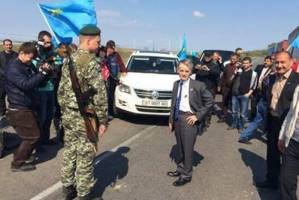
Charges over a supposed incident 6 months ago which result in three men being remanded in custody for (at least) two months are already a matter of concern. In this case, the court and prosecution have clearly not even learned their roles, with the charges and the claims of ‘Right Sector’ involvement and extremism seeming unrelated.
On Oct 24 Crimean Tatar activist Tair Smedlyaev was remanded in custody for two months at a closed court hearing. The Crimean Field Mission on Human Rights reports that the judge based the ruling on the prosecution’s claim that 60 people have asserted that Smedlyaev is an ‘extremist’. There was apparently also a statement from the Crimean ‘Centre for Countering Extremism’ which claimed that Smedlyaev is also a member of the Ukrainian nationalist organization ‘Right Sector’.
As reported, Tair Smedlyaev, brother of the head of the Central Election Commission of the Qurultay, or Crimean Tatar National Congress, was arrested in Stary Krym on Oct 22. His car was stopped on the road while he was driving with two sons, one only three and a half years old. The little one became understandably upset at the sight of his father being taken away by force, which in turn led to his father’s blood pressure rising dangerous and in the police holding centre an ambulance needed to be called several times.
This is the third arrest in a week, following those of Musa Alkerimov on Oct 16 and Rustam Abdurakhmanov a day later.
Emil Kurbedinov, Smedlyaev’s lawyer says that the detention order is not even related to the charges laid against his client. Smedlyaev and the other two are accused of ‘using violence against a representative of the authorities’. Kurbedinov comments: “In the police’s opinion, a representative of the authorities experienced stress as the result of the accused’s actions, and could not work”.
The charges are overtly questionable and pertain to the events on May 3 when around 5 thousand Crimean Tatars came to meet veteran Crimean Tatar leader Mustafa Dzhemiliev at the Armyansk crossing between the Kherson oblast in mainland Ukraine and the Crimea. The 71-year-old former political prisoner and Ukrainian MP had been stopped from flying to Simferopol the day before, and it seemed clear that the authorities, despite initial denials, were going to impose the extraordinary 5-year-ban on Dzhemiliev entering his native Crimea while under Russian occupation.
Mustafa Dzhemiliev and the Crimean Tatars who came to meet him were confronted by Russian OMON riot police and Crimean ‘police’. It was decided that Dzhemiliev would return to Kyiv in order to avert bloodshed. There were protests that day, and some roads were blocked, but there were no reports of any ‘representative of the authorities’ having in any way suffered.
Natalya Poklonskaya, the so-called ‘Crimean prosecutor’ immediately announced criminal investigations over supposed ‘extremism’, and a number of people were fined on administrative charges related to the protests. Any other charges 6 months on would already strain credulity, but remanding three people in custody of (a minimum of) two months looks very much like open intimidation, aimed at warning other Crimean Tatars of what they could expect.
Nikolai Zboroshenko from the Crimean Human Rights Field Mission fears that this may become a Crimean version of the Bolotnaya Square prosecutions. The fact that the men have been remanded in custody, judging by the cases in Russia over anti-Putin demonstrations on Bolotnaya Square on May 6, 2012 , probably means that real prison terms are planned.
Nariman Dzhelyal, deputy head of the Mejlis, or representative body of the Crimean Tatar people says that aside from providing legal aid, there is not much they can do. They need to be clear that under Russian occupation, the authorities will come down heavily on any attempts to hold peaceful protest or in other ways freely express their views.
Crimean Tatar Mejlis will not register as a ‘civic organization’
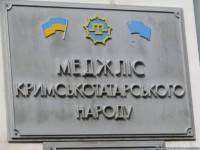
Deputy Head of the Mejlis, or representative-executive body of the Crimean Tatar People, Akhtem Chyyhoz has stated that the Mejlis will not be registering within the framework of Russia’s legislation on civic organizations and associations.
“The point is that they are suggesting that we register at the level of a civic organization which is unacceptable since the Mejlis of the Crimean Tatar People is an elected representative body. It is impossible to put it in the same category as civic organizations”
Chyyhoz was commenting on the remarks made by Remzi Ilyasov, once a member of the Mejlis and now deputy speaker of the Crimean parliament who claimed to see nothing wrong with the Mejlis registering as a civic organization, and said that this could be done by the end of the year.
“We are living now in such a state which has its rules, its demands and we must observe them”, Ilyasov said at a press conference.
Chyyhoz says that the authorities of occupied Crimea have been given proposals from the Mejlis regarding recognition and the form of dialogue with the representative body of the Crimean Tatar people. There has so far been no response.
Sergei Aksyonov, the self-proclaimed prime minister of the Crimea recently stated that he did not plan to speak with the Mejlis until it was formally registered.
The Mejlis and its leaders came under pressure soon after Russian annexed the Crimea in March 2014, following the long-denied invasion by Russian forces.
First veteran Crimean Tatar leader, former Mejlis leader and Ukrainian MP Mustafa Dzhemiliev was banned from his homeland for 5 years, then the current head of the Mejlis Refat Chubarov received an identical ban.
The Mejlis called on Crimean Tatars and all concerned about the situation in the Crimea to boycott first the pseudo-referendum on March 16, then the ‘elections’ on September 14. On Sept 17 the FSB [Russian security service] turned up with armed men and carried out a 12-hour-search of the Mejlis premises in Simferopol. The following day, the Mejlis, the Krym Fund and the Mejlis’s newspaper Avdet were forcibly evicted.
These are the most overt, but by no means the only attempts made to undermine the authority of the Mejlis and / or crush it.
News from the CIS countries
Russian antagonism and suspicion of USA and EU at all time high
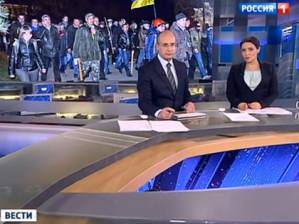 One of the television channels which night after night repeats ‘news’ with a slant that very closely corresponds to the results of this survey
One of the television channels which night after night repeats ‘news’ with a slant that very closely corresponds to the results of this survey
According to the latest Levada Centre survey, carried out from Sept 26-29, the percentage of Russians who view relations between the USA and Russia as hostile rose from 4% in January 2014 to 39% in September. 16% saw relations between Russia and the EU as hostile in September, as against 1% in January. 50% of Russians call relations with European partners as tense.
This is diametrically opposite to the assessment of relations with China. 19% are convinced that there are friendly relations between the two countries; 25% - good-neighbourly; and 35% - normal [as in OK].
79% of Russians consider the largest western countries to be Russia’s opponents who are using Russia to resolve their own problems. Only 8% view the USA and European countries as Russia’s partners with common interests. However 66% believe that Russia needs to settle its relations with the USA and other western countries. Only 25% saw no need to establish mutually beneficial and friendly relations.
Respondents agreed that Russia was more isolated from the west than at any time in the last 20 years, however 59% were undisturbed by that, with only 36% expressing concern at Russia’s growing isolation.
The number of Russians who believe that the current Ukraine crisis will result in a new cold war has reached its highest ever and stands at 40%. The Levada Centre points out that no other conflict, including Chechnya, has aroused such pessimism in the last 15 years.
79% believe that western countries in criticizing Russian policy in relation to Ukraine are trying to weaken Russia.
On the other hand, more than half (55%) believe that Russia should follow its own economic and political interests pertaining to CIS countries, but not interfere in the internal affairs of its neighbours.
The worsening in the foreign political situation and increase in anti-Western rhetoric have resulted in an increase in the sense of threat from the western world. 84% consider that Russia now has enemies, this being the highest finding in all the years that surveys have been carried out.
From the report here
Persecution of elderly activist exposing Russian soldiers’ deaths in Ukraine continues
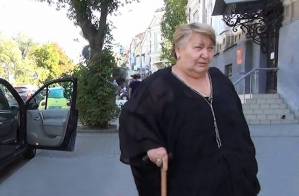
Ludmila Bogatenkova, the 73-year-old head of a regional Soldiers’ Mothers Committee in Buddyonovsk was released from detention on Monday, Oct 20. The reason for this apparently humane move is unfortunately brutally cynical: Bogatenkova’s state of health made the authorities fear that she would not survive the detention, and her arrest had already received wide media coverage.
As reported here, Ludmila Bogatenkova and her committee have been actively investigating the death of Russian conscripts and contract soldiers in Ukraine. The major offensive against her since Oct 17 began with a search of the Soldiers’ Mothers’ Committee premises. This revealed nothing that could legitimately be of police interest.
Bogatenkova was back at home when the investigators turned up and arrested her on suspicion of ‘fraud on a particularly large scale’.
A court on Oct 18 ordered that the 73-year-old who is in poor health, with a number of serious illnesses, and needs daily medication be remanded in custody. As if this were not enough, she was taken by car to Pyatygorsk, a city some 140 kilometres away. There, however, the SIZO [detention centre] staff refused to admit her because her condition was so life-threateningly bad. Despite this damning verdict on the Russian court that issued her detention order, she was still held for two nights in a police holding facility in Buddyonovsk.
Bogatenkova had refused to accept the lawyer whom the investigators provided and insisted on her own choice. Andrei Sabinin was with her on Monday after her release. He told TV Dozhd that she was in a very poor state, with high blood pressure and her hospitalization was being considered. (Update: On Tuesday Ludmila Bogatenkova was admitted to hospital, in a cardiology unit).
Sabinin says that although the investigator has the right to issue a decision to release a person from detention, this case is quite unique, given that Ludmila Bogatenkova had been remanded in custody by a Russian court on Saturday and then released by the investigator on Monday. He believes the publicity that her arrest received was a factor in her release.
Ludmila Bogatenkova has now been released on a signed undertaking ‘not to abscond’. She has difficulty moving without assistance and would die without daily medication, making any suggestion that she might try to hide preposterous.
As is everything in this shocking case.
As reported, human rights colleagues are unanimous in viewing Bogatenkova’s arrest and detention as an act of intimidation because of her work.
It seems most likely that this extraordinary case is linked with her active investigation of the deaths that the Russian authorities are trying to conceal or lie about – those of soldiers and conscripts who died fighting in Russia’s undeclared war against Ukraine. On Aug 28 her Committee drew up a list of around one hundred Russian soldiers killed and a further three hundred injured. At the time Bogatenkova told TV Dozhd that the list had been put together from various sources in the armed forces which, for obvious reasons, she could not reveal. It was sent to the President’s advisory committee on human rights.
Bogatenkova also sent the human rights council information about the deaths of 9 contract soldiers from the eighteenth mechanized infantry brigade.
Sergei Kryvenko from that Council made it clear that he and his colleagues viewed the arrest as linked with Bogatenkova’s investigation into the deaths of soldiers and promised that they would demand an explanation from the Investigative Committee.
It was on the basis of the letter Bogatenkova wrote that Ella Polyakova, head of the NGO Soldiers Mothers of St Petersburg and member of the human rights council, wrote to the relevant department of Russia’s Investigative Committee. The letter asked for a check to be carried out of the death of servicemen in July and August and for a criminal investigation to be initiated over supposed fatal accidents or suicides while conscripts were on training exercises.
The letter pointed out that the authorities should have initiated the check themselves and warned that if the military investigators refused to initiate such investigations, they would be forced to publish information about this in the same media which posted the reports of the men’s death. No answer has yet been received.
In the meantime secrecy and subterfuge prevail. Relatives have clearly been placed under pressure to conceal details about – or even the fact of - a soldier’s death. Bereaved wives have been told that their husbands had ‘resigned’ from the military (if they were on contract work) before they died. This also has practical ramifications depriving widows, often with children, of the assistance which they could otherwise expect. Relatives are told that their husbands / sons died, for example, of heart failure or committed suicide. Moscow’s line has consistently been to deny the involvement of Russian forces. Where absolutely forced to acknowledge that a Russian soldier was fighting, it is claimed – and pushed in the pro-Kremlin media – that he had taken ‘leave’ which he used to go and fight in Ukraine.
According to Yelena Vasilieva, initiator of the Cargo 200 from Ukraine to Russia project, as of the middle of October, 4, 360 Russian servicemen had been killed in Ukraine. She says that the Russian defence ministry has admitted to 900 deaths.
With a number of journalists and NGOs stubbornly refusing to stay silent, repressive measures or attempts to frighten people into keeping their mouth shut have also been applied.
Lev Shlosberg, an opposition politician and journalist in Pskov was seriously attacked just days after he divulged information about the Pskov paratroopers whose death in Ukraine Russia had been trying to conceal. It appears that virtually an entire regiment was killed.
The St Petersburg Committee of Soldiers’ Mothers was declared a ‘foreign agent’ a few days after it began revealing information about soldiers being killed in Ukraine.
The charges against Ludmila Bogatenkova, the fact that a Russian judge was willing to remand her in custody despite the obvious danger to her health and lack of any objective need for such a harsh measure, speak for themselves.
Please help circulate information about this case and about the investigations into the deaths of Russian soldiers that Moscow is so clearly trying to silence, together with those brave individuals who speak out.
Kremlin plays ‘extremist’ card against ’Memorial’ rights organization
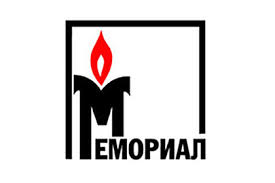
Russia’s Justice Ministry and the pro-Kremlin television channel NTV have launched a major attack aimed at destroying one of the most important human rights organizations now active in Russia. The world-renowned Memorial society is known for its defence of Russian political prisoners; for revealing grave human rights crimes committed by the Russian federal forces; for its representation of the families of victims of the Katyń Massacre, and much more.
There is no official information as to the grounds for the Ministry’s move which follows attempts last year to force the organization and its regional branches to register as a ‘foreign agent’. The application to the Supreme Court was lodged on Sept 25 and is due to be heard on Nov 13.
Jan Rachinski, co-head of the Moscow branch expects that the Ministry will cite what it claims to be infringements in Memorial’s organizational structure. It is noticeable that the government news agency RIA Novosti, while also saying that the reason is unknown repeatedly mentions * that Memorial’s “original main task was to preserve the memory of political repression in Russia. Today the International Memorial Society carries out research, human rights and educational work.”* The ploy may well be to accuse Memorial of breaching the aims and activities it declared when founding the organization, and to create the impression that Memorial has deceived people.
The lies could not be more offensive. Memorial has from its earliest days been committed to naming the victims of a murderous regime, to finding their graves, or at least giving their children or grandchildren the chance to finally learn their fate. There is no overstating the importance of that role for Russians, Ukrainians, people from all other republics, but other roles have also been forced on the organization in more recent years. Memorial itself calls its work “a combination of historical-educational work with human rights defence, aimed at eradicating present human rights violations. Both these directions are currently at the centre of the struggle. History is today again used by the state as a means of propaganda. The new state ideology proposes not criticizing, not analysing the past, instead being proud of it. Human rights activism is subjected to constant attack by the authorities. There is an active campaign on to discredit civic organizations in the eyes of the public. Tools of control are being strengthened, and new quasi-civic organizations created”.
It seems ominously clear, however, from the report on the Gasprom owned NTV that Moscow is planning to use its ‘extremist’ card against Memorial. NTV’s report is entitled “Human rights activists from Memorial exposed supporting extremists” and begins:
“The Russian Justice Ministry has asked the Supreme Court to stop the activities of the Memorial Centre. The Human Rights Centre has been placed on the list of ‘foreign agents’, receives grants from abroad and often helps people who are accused of terrorism and extremism. NTV has video recordings confirming that the so-called human rights activists openly support members of radical groups”.
The report is overtly manipulative. Oleg Orlov, head of Memorial, is reported to have promised to cause problems for police officers who refused to allow him into the zone of a counter-terrorist operation. “It’s not difficult to guess what kind of help the terrorists needed from the human rights activist. However the attempts by Orlov and Lokshina** to exert influence on the enforcement officers were not successful. The bandits were “eliminated”.
NTV goes on to claim that Memorial employees have previously “shown excessive concern for terrorists”. It mentions a tape made by Memorial where Ramil Yarmagomedov gives a graphic account of how the enforcement officers tried to abduct and then kill him. NTV asserts that this same man fled, and later turned up “at a base of an international terrorist organization” in Syria, and is now one of the fighters of the Islamic State.
There is no independent proof of this, and even if there were, it would not have any bearing on Memorial’s report of an alleged abduction attempt in May 2012.
This is not the first time that NTV has been used to manipulate public opinion and act as prosecutor and court. In July 2014 two Russian left-wing activists Sergei Udaltsov and Leonid Razvozzhaevwere convicted of “organizing mass riots” on Bolotnaya Square in May 2012. Razvozzhaev was abducted from the centre of Kyiv while applying for asylum shortly after a scandalous anti-opposition film on NTV which formed the basis for the criminal charges against both men.
With respect to Memorial, NTV’s claim that there is information “about other extremists” on the organization’s website is a conscious distortion of the facts.
Over recent years Memorial, via the Memorial Human Rights Centre, has played a vital role in highlighting grave rights violations in the Caucuses. Its people have come under attack and on July 15, 2009 Natalya Estemirova was abducted from Grozny and murdered.
The perpetrators of those crimes targeted rights defenders who told the truth about what was going on and tried to help victims of abuse. The reports issued by Memorial and other NGOs have been repeatedly confirmed by international organizations and by the European Court of Human Rights.
On Oct 9, 2014 in the case of Saltygov and others v. Russia*** the Court in Strasbourg found the Russian government guilty of multiple violations of the European Convention in connection with the disappearances of 17 men and 1 woman after allegedly being arrested in Chechnya by Russian servicemen. In all cases, for example, Russia was found to have violated the right to life (Article 2) both through the disappearances and through the failure to properly investigate.
The Memorial Human Rights Centre was among the organizations who provided the victims’ families with legal assistance. Or, in NTV’s likely rendition, abetted ‘extremists’ – acting in cahoots, of course, with the European Court of Human Rights.
Russia has been using charges of ‘extremism’ against those who dare to express ‘dissident’ views for a number of years now. It has recently been using the same tactics against the Crimean Tatars in occupied Crimea. The NTV programme suggests that the Kremlin may have decided to use the real danger posed by the Islamic State, etc. to try to remove an organization which has rightly highlighted its abuses by fabricating accusations of ‘extremism’ and ‘terrorism’.
The RIA Novosti report
Минюст просит Верховный суд ликвидировать организацию "Мемориал"
http://ria.ru/incidents/20141010/1027817622.html
NTV report
Правозащитников из «Мемориала» уличили в поддержке экстремистов
** Tatyana Lokshina is a senior researcher at the Russian office of Human Rights Watch
*** The case of Saltygov and others v. Russia
Memorial: Russia pushed onto a customary and tragic path

38 years ago, on 30 October 1974 prisoners of the Mordovia and Perm labour camps, as well as the Vladimir Prison for the first time marked Political Prisoner Day in the USSR by holding hunger strikes and other protests.
Today we mark 30 October not only as Remembrance Day for the Victims of Political Repression, but as Day of the Political Prisoner – now in contemporary Russia.
Events of the last weeks have shown that in dialogue with the opposition, the Russian authorities intend to primarily use the language of repression – arrests, trials, camps. Once again, as in the 1920s and 1930s experience in fabricating political trials is in demand. Yet again we are hearing incantations about “foreign agents”. They’ve also found a need for recent “Caucasus” experience of abductions and secret prisons.
Russia is again being pushed down a customary and tragic path.
We are not invoking a sense of responsibility before history from our State leaders - they would appear to be devoid of such a feeling. We are not calling to the sense of self-preservation of the Russian ruling elite. For that sense to be felt, there needs to be at least an approximate understanding of reality and this understanding among those now in power is effectively missing.
We are turning to the public, relying on their civic maturity. We do not have a recipe for preventing Russia from slipping into new spirals of revolution and State terrorism. We must seek ways together to counter the insane suicidal steps taken by the regime. The only thing that we believe we must call on all civic forces regardless of their political orientation to do is to unconditionally reject violence in any form. We call for calm, wisdom and endurance.
We are capable of defending freedom, relying on the law and not on force.
The Board of the International Memorial Society





